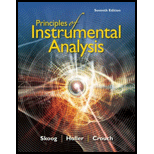
Principles of Instrumental Analysis
7th Edition
ISBN: 9781305577213
Author: Douglas A. Skoog, F. James Holler, Stanley R. Crouch
Publisher: Cengage Learning
expand_more
expand_more
format_list_bulleted
Question
Chapter 30, Problem 30.4QAP
Interpretation Introduction
Interpretation:
The principle of separation by CZE is to be stated.
Concept introduction:
The capillary zone electrophoresis is a type of electrophoresis in which separation of buffer solution takes place because of electrosoomotic flow. The buffer solution remains constant throughout the separation process. The rate of electrosoomotic flow controls the rate of migrating particles. The ionic compounds are easily separated by this method. The separation solution depends on the physical characteristics of the compound such as hydrodynamic radius, charge and ionic force of ions.
Expert Solution & Answer
Trending nowThis is a popular solution!

Students have asked these similar questions
what is the principle of GC-MS?
What is quantitative transfer and why is it used?
What kind of samples can be analyzed by AFM? What are the applications of AFM?
Knowledge Booster
Similar questions
- What is the simplest CGS unit for "poise"?arrow_forwardEnumerate the differences between a serological and a volumetric pipette and enumerate the uses, advantages, and limitations of a glass versus a plastic volumetric pipette.arrow_forwardWhat types of flow meters are used in gas chromatography?arrow_forward
- The density of the first fraction collected would be expected to be close to a value of ______. 1.00 g./mL 0.895 g/mL 0.789 mL 0.950 g.mLarrow_forwardWhy are some of the detectors listed unsuitable for HPLC?arrow_forwardwhat ccan be a cause of not getting a baseline separation when it comes to chromatography? if it is not a hardware problemarrow_forward
- What are the advantages and disadvantages of liquid-liquid extraction method?arrow_forwardgive two examples of internal standards for menthol and thc analysis.arrow_forward1. For the following chromatography state what the mobile phase is, stationary phase is, and what would elute first for each of the chromatography type... HPLC Gas Chromatography Ion Exchange Chromatography Size Exclusion Chromatography (SEC) Affinity Chromatography Reverse Phase Chromatography Normal Phase Chromatographyarrow_forward
- Peak area is used for quantitative analysis in gas-liquid chromatography. True Falsearrow_forwardTo minimize systematic errors in the separation using TLC, which of the following factors should be controlled and made constant as much as possible? Choices: Sample quantity Solvent composition and concentration Temperaturearrow_forwardwhat is the difference between liquid phase extraction and solid phase extraction?arrow_forward
arrow_back_ios
SEE MORE QUESTIONS
arrow_forward_ios
Recommended textbooks for you
 Principles of Instrumental AnalysisChemistryISBN:9781305577213Author:Douglas A. Skoog, F. James Holler, Stanley R. CrouchPublisher:Cengage Learning
Principles of Instrumental AnalysisChemistryISBN:9781305577213Author:Douglas A. Skoog, F. James Holler, Stanley R. CrouchPublisher:Cengage Learning Macroscale and Microscale Organic ExperimentsChemistryISBN:9781305577190Author:Kenneth L. Williamson, Katherine M. MastersPublisher:Brooks Cole
Macroscale and Microscale Organic ExperimentsChemistryISBN:9781305577190Author:Kenneth L. Williamson, Katherine M. MastersPublisher:Brooks Cole EBK A SMALL SCALE APPROACH TO ORGANIC LChemistryISBN:9781305446021Author:LampmanPublisher:CENGAGE LEARNING - CONSIGNMENT
EBK A SMALL SCALE APPROACH TO ORGANIC LChemistryISBN:9781305446021Author:LampmanPublisher:CENGAGE LEARNING - CONSIGNMENT

Principles of Instrumental Analysis
Chemistry
ISBN:9781305577213
Author:Douglas A. Skoog, F. James Holler, Stanley R. Crouch
Publisher:Cengage Learning

Macroscale and Microscale Organic Experiments
Chemistry
ISBN:9781305577190
Author:Kenneth L. Williamson, Katherine M. Masters
Publisher:Brooks Cole

EBK A SMALL SCALE APPROACH TO ORGANIC L
Chemistry
ISBN:9781305446021
Author:Lampman
Publisher:CENGAGE LEARNING - CONSIGNMENT